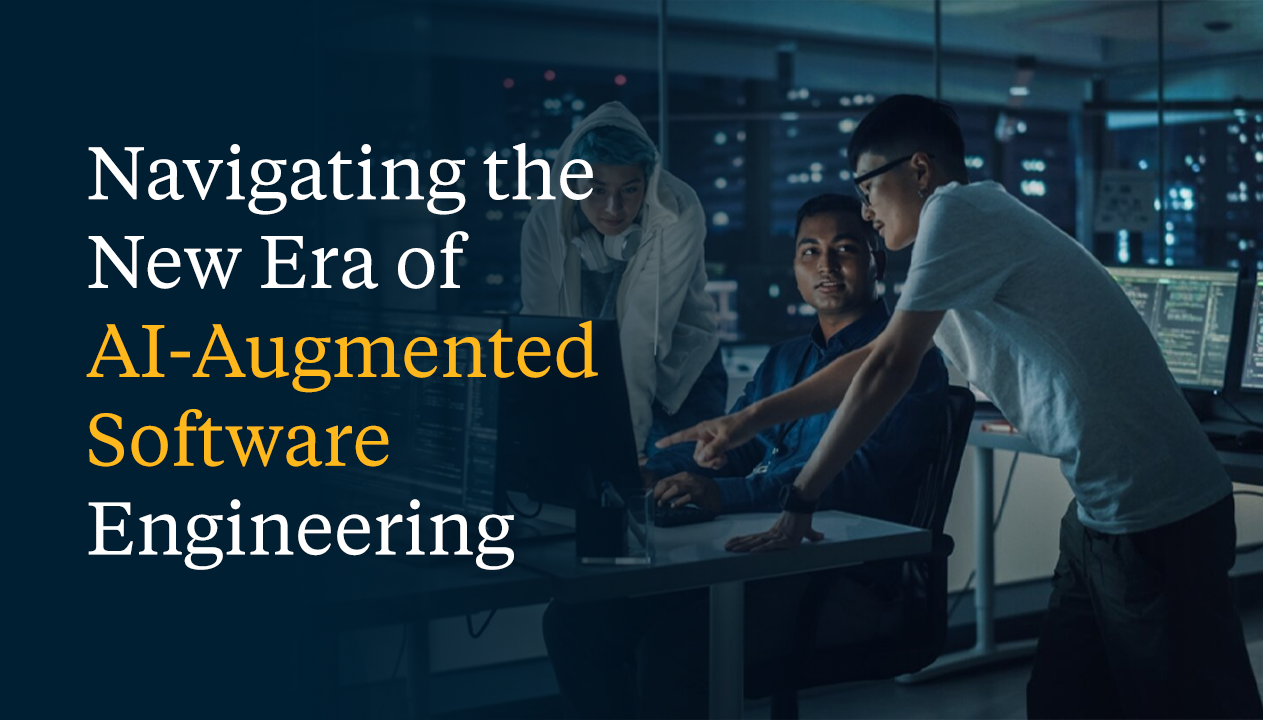Navigating the New Era of AI-Augmented Software Engineering
5 minutes
17th of January, 2024

In the ever-evolving realm of software engineering, the integration of Artificial Intelligence (AI) has ignited some major changes . Looking at AI-augmented software engineering, it becomes clear that we are on the verge of a paradigm shift – especially in the way software is conceptualized, developed, and maintained. The influence of AI in this field is undeniable, and businesses should be ready to position themselves to leverage these advancements.
Revolutionizing Software Engineering with AI
The integration of AI is revolutionizing software engineering. AI's strength in automating complex tasks, generating code, and refactoring legacy systems is redefining the essence of software development. This revolution extends beyond efficiency; it paves the way for a new era of innovation. By shouldering the burden of repetitive and data-intensive tasks, AI frees engineers to focus on strategic and creative aspects of software development, thereby enriching the development process.
The Human Element in AI-Augmented Software Engineering
In this AI-augmented era, the human element remains irreplaceable, complementing AI's efficiency and innovation. AI's knack for automating routine tasks is unparalleled, but it is human expertise that steers strategic decision-making and planning. The human touch is crucial in suggesting optimizations, aligning AI applications with broader business objectives, and upholding ethical standards. Furthermore, human oversight in quality assurance, especially with AI-generated code, is key. This includes addressing challenges like flawed code generation, where developers' feedback is crucial in refining AI's accuracy. Businesses should look toward a collaborative process where AI supports and amplifies the creative and strategic aspects of software development.
Transforming Developers' Roles: The 'Left Shift'
A significant transformation is underway, particularly in the 'left shift' of developers' roles. This shift, fueled by Generative AI solutions, is reshaping the traditional software development cycle, moving key activities to earlier stages. With AI-driven tools for tasks like code generation, debugging, and automated testing, developers are now engaging more profoundly in the initial phases of development. This early involvement facilitates a proactive approach in shaping the software’s architecture and functionality, aligning more closely with business and user needs from the start. Consequently, developers go beyond the limits of coding to embrace broader aspects of software design, user experience, and system integration.
Modernizing Legacy Systems: A Path to the Future
The modernization of legacy systems, relics of the digital era, presents a challenge in software engineering. These systems, often built on antiquated languages or running on mainframe systems, are critical to operations in sectors like finance and government. AI offers an unparalleled opportunity to bring these systems into the contemporary era. Through AI-driven analysis, code translation, and automated refactoring, software engineers can rejuvenate these legacy systems, rendering them cloud-ready and more aligned with modern business needs.
Blueprinting the AI-First Architecture
In architecting the future of software engineering, a strategic blueprint is essential. This involves not just integrating AI technologies but reimagining the architecture of software systems. AI-driven design-to-code transformations and system architecture redesigns are the cornerstones of this blueprinting process. By envisioning an AI-first architecture, businesses are not just preparing for the future; they are actively constructing it.
AI-Augmented Software Engineering: Akkodis's Commitment
As AI's role in software engineering continues to expand, so does our commitment as a provider. We are dedicated to offering more than just AI-augmented solutions and services. Rather, we are a full partner in our clients' digital transformation journeys. Positioned to support our clients in adopting AI-augmented software engineering, we ensure they remain ahead of the curve in a rapidly evolving technological landscape.
AI-Augmented Development: A Service Model
The role of AI in software engineering extends beyond traditional product offerings, ushering in an era where AI-augmented development itself becomes a service. This model shift enables enterprises to access AI-driven development processes, from design to deployment, as a comprehensive service. It represents an ecosystem where AI and human expertise combine to create innovative, efficient, and bespoke software solutions.
Customized and Collaborative Approach
Recognizing the unique challenges and objectives of each business, we offer customized AI integration strategies. Through collaborative development and ongoing support, we seamlessly integrate AI-augmented tools into clients' existing processes, ensuring a tailored approach that maximizes the potential of AI in software engineering.
Training and Support
Embracing AI in software development is a journey that extends beyond a single destination. We provide comprehensive training and support, empowering client teams to effectively utilize AI-augmented tools.
The Bottom Line
AI-augmented software engineering is not just a technological advancement; it's a strategic asset in the journey of digital transformation. By blending the power of AI with human expertise and a client-centric approach, we are not just transforming software engineering processes; we are redefining the future of software development and maintenance. To learn more about how Akkodis can help your organization effectively utilize AI in any area,contact us today!